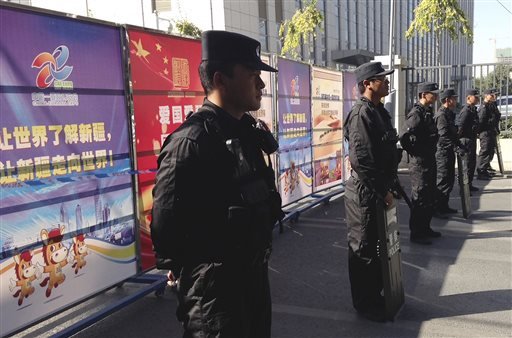URUMQI, China -- A high-profile Muslim Uighur scholar and government critic denied he had encouraged separatism as he stood trial Wednesday in China's far western region of Xinjiang, where authorities say terrorists are seeking an independent state.
Ilham Tohti, a former economics professor in Beijing, is accused of fanning ethnic hatred and advocating the overthrow of Chinese rule in Xinjiang. Ilham Tohti's supporters say he is a moderate who has sought a middle road in resolving the region's ethnic tensions and that his critiques of Chinese policy have always stayed within the law.
One of his lawyers, Liu Xiaoyuan, said Ilham Tohti denied the allegations in court Wednesday.
"He's against separatism," Liu said during an afternoon pause in the court proceedings. "He has only talked about some of the legal and cultural issues of Xinjiang. He's against splitting the country."
Ilham Tohti's trial, being held under tight security at the Urumqi People's Intermediate Court, was expected to last two days, but it was not clear when a verdict would be announced. Foreign journalists were not allowed inside, court officials announced no details and the court's phone rang unanswered.
Police formed a several-block perimeter around the venue with tape, keeping away journalists, bystanders and Western diplomats from eight nations and the European Union who traveled to Urumqi in an attempt to witness the trial. Around noon, police blocked views of the street leading to the courthouse with eight tall panels that had been used to promote the China-Eurasia Expo in Xinjiang earlier this month.
Liu said Ilham Tohti appeared in casual clothes and was not wearing handcuffs. Four family members -- including his wife, Guzulnur -- were allowed to attend the proceedings.
"He's never done anything illegal," Guzulnur said during the afternoon break. "He's never talked about separating the country. He's never opposed the government. He's never opposed the people. He's a scholar."
She said her husband's health was not good. Another of Ilham Tohti's lawyers, Li Fangping, has said the scholar was shackled for more than a month while in detention. On Wednesday evening, emerging from court, Li said his client's weight had fallen from 178 pounds to 143 pounds.
Chinese authorities also detained seven of Ilham Tohti's students in January when they apprehended him, said the parents of one student who were waiting outside the courthouse Wednesday. The parents said they had not heard any news of their son since his arrest. Police stopped the interview, and The Associated Press is withholding the parents' names because of threats to their safety.
Ilham Tohti has long been a critic of what he calls the systematic exclusion of Uighurs from the economic benefits brought to Xinjiang by migrants from China's Han majority, and has sought to prevent the Turkic Uighur language and culture from being marginalized.
He was arrested in Beijing amid an uptick in violence in Xinjiang linked to separatist militants, and authorities have blamed him for fomenting some of the unrest. More than 300 people have been killed over the past year and a half, nearly half of them shot by police in a strike-hard campaign launched by the government to fight what it calls terrorist cells in the region.
Ilham Tohti has warned in the past that Chinese authorities might overdo their anti-terrorism measures to conceal incompetence of local governments in Xinjiang.
Last October, when three Uighurs killed six people, including themselves, in a fiery car crash at central Beijing's Tiananmen Gate, Ilham Tohti urged authorities to make public their evidence corroborating their conclusion that it was a terrorist attack.
Dilxat Raxit of the German-based advocacy group World Uyghur Congress, called Ilham Tohti's trial a "persecution," and said it would exacerbate tensions between Uighurs and China's leadership.
The trial is to continue today.
Information for this article was contributed by Didi Tang of The Associated Press.
A Section on 09/18/2014
